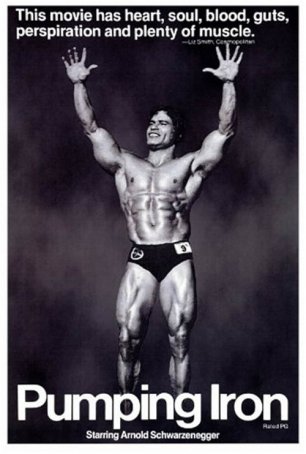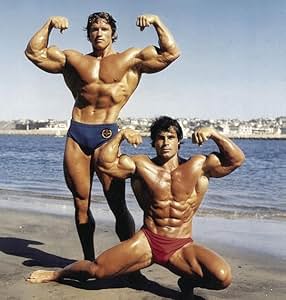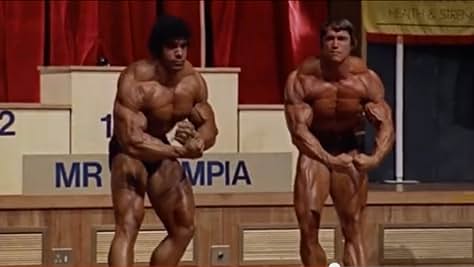Pumping Iron (United States, 1977)
November 14, 2024
Pumping Iron is a puff piece. From its partly-scripted elements to its decision to focus on the most relatable aspects of bodybuilding, the movie is as far from a hard-hitting documentary as one can find. (For example, the rampant use of steroids isn’t mentioned. Their usage at the time was commonplace.) But that’s okay – the film’s purpose, to focus on the star power of Arnold Schwarzenegger, is easily achieved. And, for those on the lookout for beefcake eye candy, there’s no shortage of that. In fact, the musculature on display is so extreme that it almost seems like a special effect.
The movie’s structure is to follow two key competitors (and a few others along the way) on the road to the 1975 Mr. Olympia contest in Pretoria, South Africa. Schwarzenegger, 28 years old at the time, was on the fast track to bigger things than bodybuilding fame. Although his breakthrough role in Conan the Barbarian was still seven years in the future, Hollywood had already come calling. By the time Pumping Iron was lensed, he had already appeared in three movies: Hercules in New York (as “Arnold Strong”), The Long Goodbye, and Stay Hungry (for which he won the “New Star of the Year” Golden Globe). He was a five-time Mr. Olympia champion defending his title for the last time (he announced his intention to retire after this competition). His key challengers were Frenchman Serge Nubret and American Lou Ferrigno. Pumping Iron developed Ferrigno as Schwarzenegger’s foil – the latter easygoing and confident, the former shy, self-doubting, and intense.
 Most of Pumping Iron concentrates on getting to know
the principals. Schwarzenegger, with his affable swagger and larger-than-life
personality, is a tremendous interview subject. In one memorable clip, he
likens the high a bodybuilder gets to a sexual orgasm. In another, he talks
about how he missed his father’s funeral because he was preparing for a
competition. (The actor later admitted that he made this up to create a more
compelling film personality.) Ferrigno is presented as an up-and-comer whose
insecurities threaten to derail him. He and Schwarzenegger are friendly, but
Ferrigno often seems in awe of the older man. The movie also gives screen time to
other bodybuilders (like Mike Katz and Franco Columbu) but they’re on the
periphery. Pumping Iron is about Schwarzenegger vs. Ferrigno.
Most of Pumping Iron concentrates on getting to know
the principals. Schwarzenegger, with his affable swagger and larger-than-life
personality, is a tremendous interview subject. In one memorable clip, he
likens the high a bodybuilder gets to a sexual orgasm. In another, he talks
about how he missed his father’s funeral because he was preparing for a
competition. (The actor later admitted that he made this up to create a more
compelling film personality.) Ferrigno is presented as an up-and-comer whose
insecurities threaten to derail him. He and Schwarzenegger are friendly, but
Ferrigno often seems in awe of the older man. The movie also gives screen time to
other bodybuilders (like Mike Katz and Franco Columbu) but they’re on the
periphery. Pumping Iron is about Schwarzenegger vs. Ferrigno.
The movie isn’t much of a “sports movie” in the traditional sense of the term. Although there are scenes from the Mr. Universe and Mr. Olympia competitions, minimal effort is made to create tension between the champion and the challenger. Pumping Iron seems like a publicity piece made to enhance the reputations of Schwarzenegger and Ferrigno. Whether or not that was the primary intention, it worked. Schwarzenegger’s reputation exploded and Ferrigno was able to snag one of the late 20th century’s iconic television roles: that of the Incredible Hulk (Hyde to Bill Bixby’s David Banner/Jekyll).
 Pumping Iron had two lasting impacts on American
culture. The first was to normalize the perception of the bodybuilder. Previously viewed as freakish, these
musclebound men emerged from the niche in which they had been relegated.
Extreme musculature no longer provoked revulsion but instead became a quality worth
striving for. The second influence was to feed into a growing physical fitness
craze that took the nation by storm in the late 1970s and early 1980s. Pumping
Iron joined the likes of The Village People (“Macho Man”) and Olivia
Newton-John (“Physical”) in promoting an exercise-based lifestyle. Home physical
fitness equipment sales skyrocketed and the number of public gyms exploded. Instead
of every city having one or two, there seemed to be one on every corner.
Pumping Iron had two lasting impacts on American
culture. The first was to normalize the perception of the bodybuilder. Previously viewed as freakish, these
musclebound men emerged from the niche in which they had been relegated.
Extreme musculature no longer provoked revulsion but instead became a quality worth
striving for. The second influence was to feed into a growing physical fitness
craze that took the nation by storm in the late 1970s and early 1980s. Pumping
Iron joined the likes of The Village People (“Macho Man”) and Olivia
Newton-John (“Physical”) in promoting an exercise-based lifestyle. Home physical
fitness equipment sales skyrocketed and the number of public gyms exploded. Instead
of every city having one or two, there seemed to be one on every corner.
The three men behind Pumping Iron (George Butler, Rober Fiore, Charles Gaines) were less interested in producing a traditional documentary than in presenting a narrative with an underdog protagonist (Ferrigno) and a charismatic villain (Schwarzenegger). Scenes were staged and lines were read. The filmmakers have never shied from this description. In retrospect, the movie is of special interest because of its presentation of Schwarzenegger during this nascent portion of his career. As a result, the film is in many ways more compelling today than during its initial theatrical run in 1977. A cheesy curiosity upon its release, it has become a valuable historical record because of the lasting cultural impact of its central figure.
Pumping Iron (United States, 1977)
Cast: Arnold Schwarzenegger, Lou Ferrigno, Matty Ferrigno, Mike Katz, Serge Nubret, Franco Columbu
Home Release Date: 2024-11-14
Screenplay: Charles Gaines and George Butler
Cinematography: Robert Fiore
Music: Michael Small
U.S. Distributor: Lionsgate
U.S. Home Release Date: 2024-11-14
MPAA Rating: "PG" (Sexual Content)
Genre: Documentary
Subtitles: none
Theatrical Aspect Ratio: 1.33:1
- (There are no more better movies of Lou Ferrigno)
- (There are no more worst movies of Lou Ferrigno)
- (There are no more better movies of Matty Ferrigno)
- (There are no more worst movies of Matty Ferrigno)
Comments